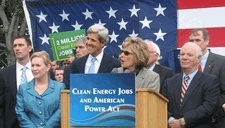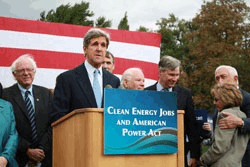Senate Climate Bill
Air Date: Week of October 2, 2009

Senator Barbara Boxer (D-CA) stands at a podium to announce the Kerry-Boxer bill on climate change. (Courtesy of: Environment and Public Works)
With international climate talks looming, all eyes are on the U.S. Senate where key Democrats introduced a new global warming bill. Host Jeff Young talks with Senators Barbara Boxer and John Kerry about their ideas for cutting greenhouse gasses without losing jobs.
Transcript
YOUNG: From the Jennifer and Ted Stanley studios in Somerville, Massachusetts, this is Living on Earth. I’m Jeff Young.
CURWOOD: And I’m Steve Curwood. It was a big week for climate change in Washington, with both the US Senate and the Obama administration taking the initial steps toward controlling greenhouse gas emissions. The US Environmental Protection Agency announced it will begin regulating CO2 coming from major sources, such as power plants. That announcement came on the very day that Senate leaders unveiled a highly anticipated climate change bill.
YOUNG: That bill, from Democrats John Kerry of Massachusetts and Barbara Boxer of California, could transform energy policy for the US, and greatly influence international agreement on global warming. Senators Kerry and Boxer launched their ambitious effort with a campaign-style rally on the Capitol lawn.
[CROWD VOICES; APPLAUSE; WHISTLING]
YOUNG: There were no polar bear costumes or planet earth placards. Instead, a giant American flag for a backdrop, signs promising new jobs, and military veterans onstage with Senator Kerry.
KERRY: We are here, and we introduce this legislation because of one word: security. Economic security, energy security, national security. It is time to reinvent the way that America uses energy.
[APPLAUSE]
YOUNG: The Democrats’ new theme on climate change is clean energy can enhance American power. Republicans weren’t buying it. Here’s Tennessee Senator Lamar Alexander.

Senator John Kerry (D-MA) announces the Kerry-Boxer bill on climate change.(Courtesy of Senator John Kerry's Office)
ALEXANDER: These are fancy complicated words for high cost energy that will send jobs overseas looking for cheap energy.
YOUNG: Regardless of party, senators from states that depend most on coal, oil and heavy industry are nervous about the cost of shifting from fossil fuels. Kerry and Boxer propose a cap and trade system, as did a similar bill narrowly passed by the House in June. The senators set a more aggressive target for reducing emissions—a 20 percent cut by 2020.
And they say that can come without sharp cost increases. I spoke with Senator Boxer as she huddled with staffers in her office. She explained a new proposal in the bill called a price collar. The goal is to ensure that the cost of emitting CO2 doesn’t go too high or too low.
BOXER: We don’t want to have a price spike that makes this very, very difficult. So, as you well know, the House bill had an $11 floor on the price of carbon. And we said at $28, we will unleash the reserve of allowances we have, which will act as a mechanism to keep that price at $28. So, we call this a soft collar. We think it will take away the argument that this is gonna somehow start a huge spike in energy costs. It’s a new proposal that really was taken from best of all the cost containment proposals we looked at.
YOUNG: What else might you have to do to meet concerns that have been raised by your fellow Democrats from Midwestern manufacturing states?
BOXER: We’re working very closely with all our colleagues: some think the bill’s too weak, some think the bill’s too strong, some think the bill is just right. You know, so we clearly want to make sure consumers are kept whole, and we believe if we do this bill there’s gonna be a whole new platform for economic growth in this country. America will be the leader - it will lead to more jobs, not fewer jobs.
YOUNG: As Senator Boxer leads the bill through her Environment Committee she must also keep in mind fellow Democrats, like Ohio’s Sherrod Brown. Senator Brown says Boxer’s bill should include a so-called “carbon tariff.” He doesn’t want countries like China to win out if we cut emissions and they don’t.

Senator Barbara Boxer (D-CA) stands at a podium to announce the Kerry-Boxer bill on climate change. (Courtesy of: Environment and Public works)
BROWN: If they’re not following any kind of strong environmental rules like we are, then they should pay a tariff at the border, an equalization adjustment, if you will, that reflects that cost, environmental cost, of production. Otherwise, the jobs tend to migrate to those countries with the weakest environmental rules.
YOUNG: The House bill included a ‘carbon tariff’ and that’s been highly controversial. It might violate World Trade Organization rules. Chinese officials warned of a trade war. And that could throw a wrench into international climate talks coming in December in Copenhagen.
[ECHOING VOICES IN HALLWAY]
YOUNG: I caught up with Senator Kerry in the Senate halls. Kerry chairs the Foreign Relations Committee and has an eye on the progress toward an international agreement. He told me he thinks some sort of carbon tariff is appropriate, if done correctly.
KERRY: It is absurd to have a country think that it can just go outside of an environmental international agreement and take advantage of selling products that are high carbon content, and we should not allow that.
YOUNG: Does that complicate getting agreement with the Chinese, though?
KERRY: Well, we’re making progress with the Chinese. Hu Jintao stood up at the UN and talked about percentage reductions. The President’s going to China in November. So, we just have to now negotiate through how do you measure, how do you verify. I think that’s achievable, personally. And one thing that will really help it be achievable – I know this from our conversations – is our moving here. If we do this, you stand a better chance of getting the Chinese to be more declarative.
YOUNG: And if you don’t pass this?
KERRY Well, I think, if it actually failed, I think that would be very injurious to the Copenhagen process. I think it would be very injurious to our foreign policy, because a lot of countries held against us walk away from Kyoto and, if we were to walk away from this, I think it would be very damaging to President Obama’s foreign policy.
YOUNG: There’s more from Senators Kerry and Boxer at our website loe dot org – and, Steve, Senator Kerry says he does not think the Senate has to complete this bill before the Copenhagen gathering. He says so long as there’s good progress — say having it approved by the important committees in the Senate— then that should send a strong enough signal to other world leaders.
Links
To hear an interview with Senator Boxer click here
To hear an interview with Senator Kerry click here
To hear an interview with Senator Brown click here
You can read the entire Kerry-Boxer bill, or a summary, at Sen. Kerry’s site
Living on Earth wants to hear from you!
Living on Earth
62 Calef Highway, Suite 212
Lee, NH 03861
Telephone: 617-287-4121
E-mail: comments@loe.org
Newsletter [Click here]
Donate to Living on Earth!
Living on Earth is an independent media program and relies entirely on contributions from listeners and institutions supporting public service. Please donate now to preserve an independent environmental voice.
NewsletterLiving on Earth offers a weekly delivery of the show's rundown to your mailbox. Sign up for our newsletter today!
 Sailors For The Sea: Be the change you want to sea.
Sailors For The Sea: Be the change you want to sea.
 The Grantham Foundation for the Protection of the Environment: Committed to protecting and improving the health of the global environment.
The Grantham Foundation for the Protection of the Environment: Committed to protecting and improving the health of the global environment.
 Contribute to Living on Earth and receive, as our gift to you, an archival print of one of Mark Seth Lender's extraordinary wildlife photographs. Follow the link to see Mark's current collection of photographs.
Contribute to Living on Earth and receive, as our gift to you, an archival print of one of Mark Seth Lender's extraordinary wildlife photographs. Follow the link to see Mark's current collection of photographs.
 Buy a signed copy of Mark Seth Lender's book Smeagull the Seagull & support Living on Earth
Buy a signed copy of Mark Seth Lender's book Smeagull the Seagull & support Living on Earth

